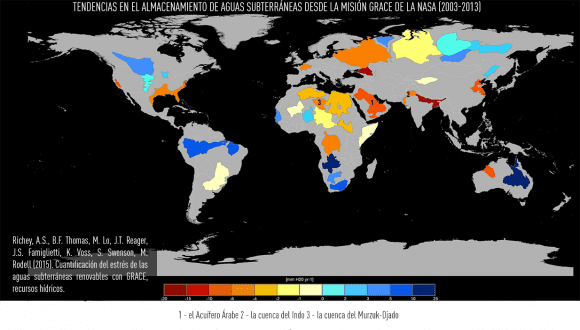Like with climate change, human action is to blame, according to the researchers.
The world is losing its underground water resources at an alarming rate, according to new data collected by NASA satellites.
According to a study released this week in the journal Water Resources Research, humans are primarily responsible for the dramatic situation. As for global warming (which is also mainly man-made), it affects water reserves in the areas located near the equator.
“Significant segments of the Earth’s population are consuming groundwater quickly without knowing when it might run out,” observed the scientists. Water intensive industrial activities like mining are especially contributing to this trend.
RELATED: No Time to Waste: World Environment Day
About one-third of the largest groundwater basins of the world (13 of 37) are quickly depleting, according to the investigation, without being replenished: most of the water extracted from aquifers evaporates after consumption, or ends in rivers and oceans with the waste it carries.
The study was based on the comparison between 2003 and 2013 images from the twin Gravity Recovery and Climate Experiment (GRACE) satellites, and the data was then processed by a joint team from NASA and the University of California.

“Given how quickly we are consuming the world’s groundwater reserves, we need a coordinated global effort to determine how much is left,” said UCI professor and principal investigator Jay Famiglietti, who is also the senior water scientist at NASA’s Jet Propulsion Laboratory in Pasadena, California, reported RT.
Aquifers of the world supply about 2 billion people with freshwater. The aquifers in danger are located in poor, densely populated areas, like northwest Saudi Arabia, India, Pakistan, and North Africa, where alternatives to underground water are scarce. In the case of a drought, people tend to “rely much more heavily on groundwater”, like in California, added Famiglietti.
RELATED: Latin America's Future Tied to Sustainable, Subsistence Farming
Alexandra Richey, the research project’s leading scientist, said the team has tried to warn the international community and call for active management of water resources today, in order to protect the future.
In April, a FAO study found that water scarcity will affect two-thirds of the world’s population by 2050 and will strongly impact on the food security of various regions of the planet. Already 40 percent of the world population lacks proper access to water, mainly because of overconsumption of water for food production and agriculture.